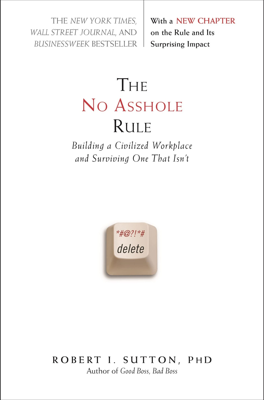What Workplace Assholes Do and Why You Know So Many
Defining Workplace Assholes
A precise definition of an "asshole" is crucial for implementing the no-asshole rule in workplaces. The term distinguishes those who are momentarily unpleasant from those who consistently demean and belittle others. Robert Sutton uses two key tests to identify an asshole:
- Test One: The target feels oppressed, humiliated, de-energized, or belittled.
- Test Two: The behavior is directed more towards less powerful individuals.
Temporary vs. Certified Assholes
- Temporary Assholes: Individuals who exhibit nasty behavior due to momentary stress or bad days.
- Certified Assholes: Individuals with a persistent pattern of abusive behavior, consistently making others feel worse about themselves.
Common Behaviors of Assholes
A "dirty dozen" list identifies typical behaviors used by assholes to demean their victims:
- Personal insults
- Invading personal space
- Uninvited physical contact
- Threats and intimidation
- Sarcastic jokes used as insults
- Withering emails
- Status slaps
- Public shaming
- Rude interruptions
- Two-faced attacks
- Dirty looks
- Treating people as invisible
Examples of Certified Assholes
The chapter provides examples of well-known individuals deemed as certified assholes:
- Chainsaw Al Dunlap: Known for verbal abuse and condescending behavior at Sunbeam.
- Scott Rudin: Hollywood producer infamous for his abusive treatment of assistants.
- Linda Wachner: Former CEO of Warnaco, notorious for publicly demeaning employees.
- John R. Bolton: Allegedly used persistent psychological abuse toward subordinates.
Prevalence of Workplace Abuse
Research indicates that workplace abuse is widespread:
- Studies and Surveys: Various studies show high rates of workplace bullying, incivility, and emotional abuse across different regions and professions.
- Nurses: Particularly high rates of verbal abuse from physicians and other sources.
- Global Perspective: Similar trends of bullying and psychological abuse are observed worldwide.
Importance of Constructive Conflict
The book emphasizes the value of constructive conflict over personal attacks. Effective organizations promote arguments over ideas in a respectful manner, improving performance and creativity, whereas personal conflicts lead to detrimental outcomes.
Distinguishing Factors
- Socially Awkward Individuals: Some may accidentally act insensitively but aren’t necessarily assholes if their intentions are not to harm.
- Behavior Towards Powerless Individuals: Treatment of less powerful people is a strong indicator of an individual's character.
Conclusion
Robert Sutton's focus is on creating environments where decent behavior is the norm and toxic individuals are reformed or removed. Promoting kindness and respect in the workplace helps build a more civilized and productive environment.
